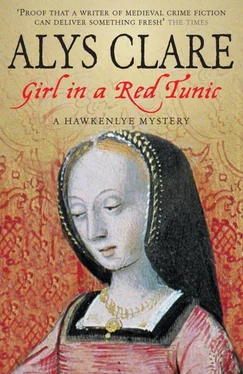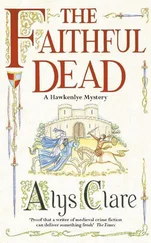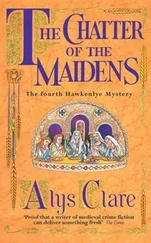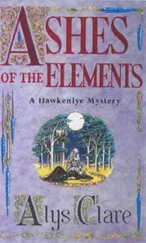Alys Clare - Girl In A Red Tunic
Здесь есть возможность читать онлайн «Alys Clare - Girl In A Red Tunic» весь текст электронной книги совершенно бесплатно (целиком полную версию без сокращений). В некоторых случаях можно слушать аудио, скачать через торрент в формате fb2 и присутствует краткое содержание. Год выпуска: 2006, Издательство: Hachette Littlehampton, Жанр: Исторический детектив, на английском языке. Описание произведения, (предисловие) а так же отзывы посетителей доступны на портале библиотеки ЛибКат.
- Название:Girl In A Red Tunic
- Автор:
- Издательство:Hachette Littlehampton
- Жанр:
- Год:2006
- ISBN:нет данных
- Рейтинг книги:5 / 5. Голосов: 1
-
Избранное:Добавить в избранное
- Отзывы:
-
Ваша оценка:
- 100
- 1
- 2
- 3
- 4
- 5
Girl In A Red Tunic: краткое содержание, описание и аннотация
Предлагаем к чтению аннотацию, описание, краткое содержание или предисловие (зависит от того, что написал сам автор книги «Girl In A Red Tunic»). Если вы не нашли необходимую информацию о книге — напишите в комментариях, мы постараемся отыскать её.
Girl In A Red Tunic — читать онлайн бесплатно полную книгу (весь текст) целиком
Ниже представлен текст книги, разбитый по страницам. Система сохранения места последней прочитанной страницы, позволяет с удобством читать онлайн бесплатно книгу «Girl In A Red Tunic», без необходимости каждый раз заново искать на чём Вы остановились. Поставьте закладку, и сможете в любой момент перейти на страницу, на которой закончили чтение.
Интервал:
Закладка:
‘Quite so,’ said the Abbess. Josse, glancing at her, did not miss the swift expression of disgust that momentarily crossed her face. Then, like her, he turned his attention to the dead man.
The flesh was white and sparse; he had been a lean man, not very tall. Josse stared at the skinny arms and looked for several moments at the hands and wrists. The limbs were stunted and the legs slightly bowed, an effect often seen, Josse reflected, in the bodies of the poor who had never had quite enough to eat. Sister Euphemia had discreetly placed a folded sheet across the man’s lower trunk so that his groin and genitals were concealed; Josse raised the corner of the sheet and had a quick look, which told him little other than that the man had had gingery body hair and had not been circumcised. Replacing the sheet, he turned to stare at the head and face. The head hair had also had a ginger tinge, although less pronounced, and the man had been in the process of going bald. With a nod to himself, as if privately noting that some earlier possibility had just turned out to be true, Josse looked at the bulging eyes — Sister Euphemia had managed to close them — and finally at the open mouth with its protruding tongue.
Noticing the direction of his attention, the infirmarer said, ‘He had rotten teeth, Sir Josse. They’d have given him gyp, I shouldn’t wonder.’
‘Hm.’ Josse hardly heard; he was thinking. He put his hands either side of the head and, raising it from the cot, moved it gently around, from side to side, then backwards and forwards. Again he said, ‘Hm.’ Then he pulled out the small object he had found in the strands of the rope and put it on the cot beside the dead man’s head. Looking up at the infirmarer, he said, ‘A match, would you say?’
With a soft exclamation she bent to look more closely. She sniffed at the dead man’s scalp and picked up the few strands of ginger-brown hair that Josse had laid beside the head and sniffed them too. She felt the head hair — still damp from her own recent ministrations — and then the stray strands, rubbing at them between her fingers. Then, replacing the loose hairs on the cot and carefully wiping her hands on a clean piece of soft white linen that smelt of lavender, she said, ‘Aye, I reckon so.’
The Abbess, who had silently been watching, said quietly, ‘Where did you find the hair, Sir Josse?’
‘In the knot of the rope.’
‘The knot-’ She swallowed. ‘You mean the noose that was around his neck?’
‘No,’ he replied. ‘The knot that bound the rope to the tree branch.’ She frowned, as if she knew that this was significant but had not yet worked out how. Since he was in much the same state, he added, ‘There is much here to puzzle us, my lady.’
‘Indeed,’ she agreed. ‘But our first task must be to try to establish the poor man’s identity, since surely someone, expecting his return, must soon miss him and wonder where he is.’
‘Aye. I had thought, my lady, of sending word to Tonbridge to ask de Gifford for his help?’
He turned the suggestion into a question and immediately she nodded. ‘Oh, yes. I could send one of the lay brothers, or …’ She looked at him enquiringly.
‘I should be happy to go,’ he said, picking up her thought. ‘I will set out immediately.’
If Gervase de Gifford were surprised at having to return to Hawkenlye so soon, he gave no indication. As he and Josse rode back up Castle Hill towards the Abbey, Josse did what he could to answer de Gifford’s questions. He had already asked the sheriff whether any man had been reported as missing and de Gifford had said no, not as far as he knew.
Although neither man had spoken the thought aloud, Josse guessed that de Gifford was wondering the same thing that was occupying him: whether the dead man could be the absent Walter Bell. Arriving at Hawkenlye, they gave their horses into the care of Sister Martha and then went straight across to the infirmary.
The corpse lay alone on its cot behind the curtain; Sister Beata stood just outside the recess, as if to ensure that the idly curious should not be allowed to approach. Seeing Josse and de Gifford, she parted the curtains for them and stood back to let them enter the recess. Josse smiled his thanks and the sheriff paused to speak a few muttered words; it sounded, Josse thought, as if he were commending the care with which the dead were treated by the infirmary nuns, for Sister Beata gave a little bob of a bow and whispered that it was ever the Abbess’s and the infirmarer’s wish that due respect be given. Then, appreciating that he was keen to proceed, she stepped back and let the curtain fall behind the two men, leaving them alone with the corpse.
Josse observed de Gifford studying the dead face. After a moment he said, ‘Is it Walter Bell?’
The sheriff looked up and his green eyes were clouded with doubt. Then, unconsciously echoing Josse’e earlier remark, he said, ‘There’s a mystery here.’ Speaking softly so that nobody but Josse would hear, he went on, ‘It’s not Walter, it’s his brother Teb.’
Josse and de Gifford went next to report to the Abbess and Josse listened as, with admirable brevity of which the Abbess seemed to approve, de Gifford outlined what he had just discovered.
‘Yet it was Teb whom you suspected was coming to Hawkenlye to search for his brother Walter, the one who is missing?’ she asked.
‘Yes, my lady.’
‘Are the brothers similar in appearance?’ Josse asked.
The Abbess nodded. ‘That was to have been my next question.’
‘You are both wondering, I would guess,’ said de Gifford, ‘whether my officer mistook Teb for Walter and it was in fact Teb who was missing and Walter who was looking for him.’
‘Aye,’ Josse replied.
‘There was a strong resemblance between them, yes, and I wish it were that simple.’ De Gifford gave a sigh and ruffled his hair vigorously as if trying to stir his brains into action. ‘But it was Teb in the tavern. My man was in no doubt of it.’
‘And you trust your man.’ Josse made sure that there was no note of enquiry in his voice; he was in any case quite sure that de Gifford would not use men whose judgement he questioned.
‘I do,’ de Gifford agreed.
‘Teb Bell is dead, then,’ the Abbess summarised, ‘and Walter, we must assume, is still missing.’ She looked intently at de Gifford. ‘Were the brothers close, would you say?’
‘Close?’ De Gifford thought for a moment. ‘Their lives were lived closely, my lady, for, as I told you, they were engaged in the same villainy and as far as I know they shared the same miserable hovel of a dwelling. But if I am correct in thinking that you are asking whether there was affection between them, then I can only say that, although I may malign them, I would doubt it. May I know why you ask the question?’
She shrugged and, to Josse’s eye, appeared suddenly diffident. ‘It seems that I am following a fruitless path but I wondered if the dead man — Teb — could have discovered that his brother had in fact died and had taken his own life because the loss was too great to bear.’
‘But, my lady, he-’ Josse began.
She misinterpreted his protest. Turning to him, diffidence changing smoothly to righteous indignation, she said, ‘Sir Josse, deep love is not the prerogative of the wealthy, the honest and the educated. Despite what the sheriff says about the Bell brothers, it is perfectly possible for a poor man, even for a thief or a murderer, to love his brother!’
Josse bowed his head. ‘Forgive me, my lady Abbess, but I would not dream of denying it. That was not what I was about to say.’
‘Oh.’ She looked slightly ruffled. ‘Then what were you going to say?’
He glanced at de Gifford, then back at the Abbess. ‘It is perhaps only to be expected,’ he began, ‘that the assumption will be made that a man found hanging at the end of a rope in an isolated spot has died at his own hand. In many such cases, I believe this is found to be true.’
Читать дальшеИнтервал:
Закладка:
Похожие книги на «Girl In A Red Tunic»
Представляем Вашему вниманию похожие книги на «Girl In A Red Tunic» списком для выбора. Мы отобрали схожую по названию и смыслу литературу в надежде предоставить читателям больше вариантов отыскать новые, интересные, ещё непрочитанные произведения.
Обсуждение, отзывы о книге «Girl In A Red Tunic» и просто собственные мнения читателей. Оставьте ваши комментарии, напишите, что Вы думаете о произведении, его смысле или главных героях. Укажите что конкретно понравилось, а что нет, и почему Вы так считаете.












